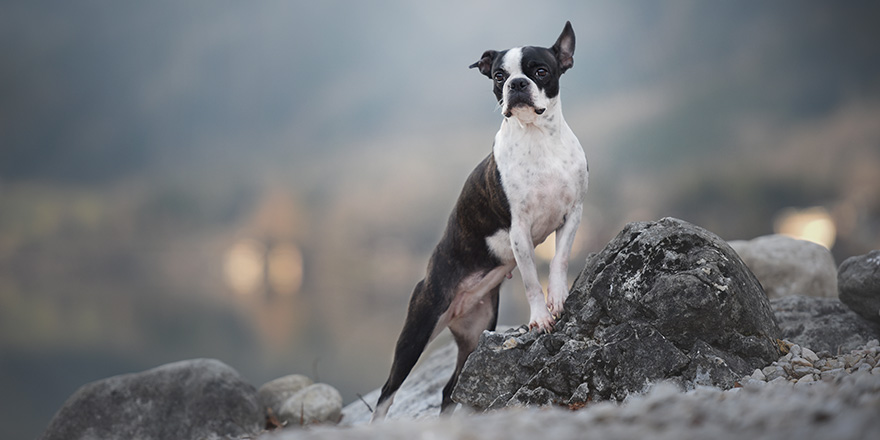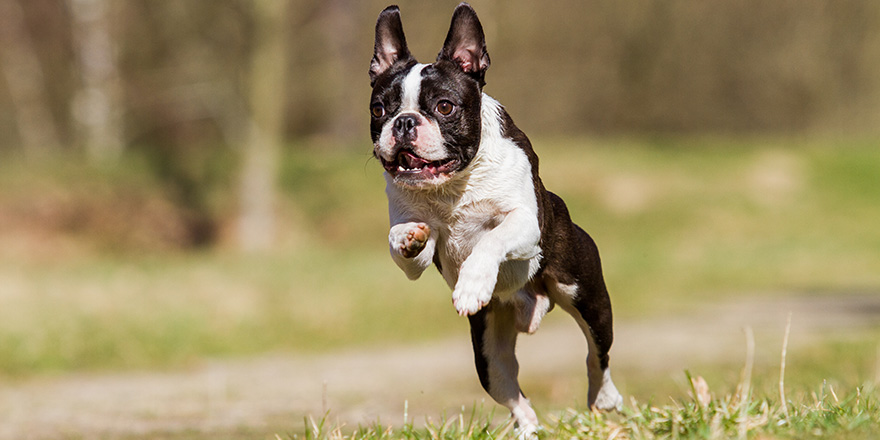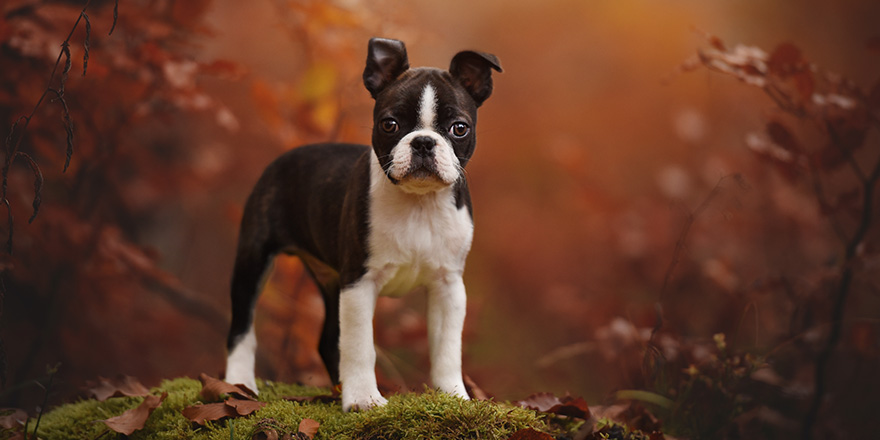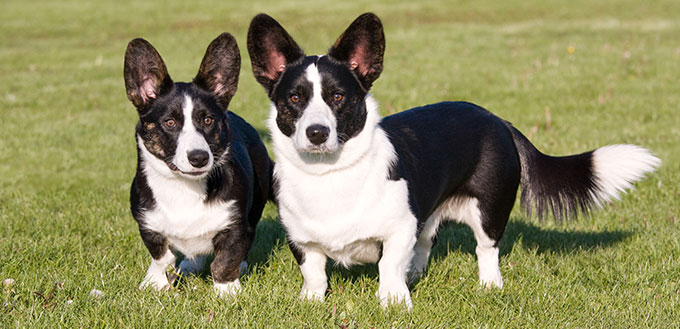Whether you have a Boston Terrier adult dog or you’re considering adopting a puppy from the breed, you should always have a good knowledge base of information about any breeds that you bring into your family. It’s never too late to learn about the various dog breeds, and Boston Terriers are certainly an excellent breed to own. These kind dogs make the perfect pet for a home that has children, and they’re highly intelligent and protective. By bringing a Boston Terrier into your life, you’re gaining a forever friend and a loyal companion to sit by your side every day.
Breed Overview
| Dog Breed Group | Height | Weight | Life Expectancy |
|---|---|---|---|
| Non-Sporting | 15 to 17 inches | 12 to 25 pounds | 11 to 13 years |
A Short History of the Boston Terrier
Named the American Gentleman dog, the Boston Terrier has a history that dates back to the 19th century. The breed’s lineage started in the late 1860s when a Bulldog and a White English Terrier were crossed and the result was a pup who would be called Judge. Judge, who was born in Liverpool, was sold to an American by the name of William O’Brien. O’Brien lived in Boston and cheerfully took his new crossbreed dog home, soon selling him to another Bostonian – Robert C. Hooper. Judge became the patriarch of the new Boston Terrier breed, and almost all true Boston Terriers can be linked back to him.
Judge would later be paired with another dog that had such similar genealogy that the generations of Boston Terriers began. Judge was a solid 32 pounds, strong, and dark brindle in color. Even today’s Boston Terriers still resemble their patriarch, though selective breeding has changed the overall shape of the breed and lessened their weight range. While Judge was stocky and more suited to blood sports, our modern Boston Terrier dogs have become smaller and more suited to life in the 21st century. They’re sweet pups that could win the hearts of any onlookers.
The Boston Terrier Club of America was formed in 1891, and the American Kennel Club registered its first dog of the breed just two years later. Boston Terriers remain a prideful part of Boston, U.S., and they are the official dog of Massachusetts.

Breed Information
Also known as Boston Bulls or Boston Bull Terriers, these dogs have a lovely temperament and are bred to become companion dogs to their owner. Though they might look a little like a pug breed at first glance, the Boston Terrier actually has no relation to pugs at all. Bred from a Bulldog and the White English Terrier, Boston Terriers are one of the few breeds to have originated in the United States of America.
They are considered a “non-sporting” dog, which is a dog breed group that describes dogs who were once developed to be hunting or working dogs but are now bred as domestic dogs. These non-sporting dogs are usually pets or show dogs. Other examples, besides the Boston Bull Terrier, include the Bichon Frise, the Dalmatian, the Chow Chow, and the Poodle.
These pups live up to 13 years of age, and their recognizable color and markings help identify them and keep them apart from similar-looking breeds. You can expect Boston Terrier puppies to be more excitable than their adult dog counterparts, but that’s to be expected for any breed. As family dogs, they certainly fulfill the usual requirements and have plenty of great traits to showcase in their behavior.
Breed Appearance
According to the American Kennel Club, the breed standard for Boston Bulls is as follows:
The Boston Terrier is smooth-coated, short-headed, and compactly built. They have a short tail, and their head is in proportion to the overall size of the dog. Their expression makes them appear to be a highly intelligent breed. Boston Terriers have short bodies with strong limbs, and none of their features are particularly prominent.
They are determined pets to own and carry themselves with grace and ease. Dog breeds like this often have a combination of coat colors and markings, though all Boston Terrier dogs will have white somewhere on their coat.
They should not exceed 25 pounds, though a dog of this breed may be under 15 pounds. They are alert, kind, and have large, dark eyes set into a square-shaped skull. Blue eyes disqualify any Boston Terrier dog from competing in American Kennel Club dog shows.
Coat Colors
Accepted Boston Terrier colors include:
- Black and white
- Black, brindle, and white
- Brindle and white
- Seal and white
- Seal, brindle, and white
Markings
The markings required by the AKC are a white muzzle band, a white forechest, and a white blaze between the eyes. The AKC also like to see other elements of other white markings along with the dog’s head and body, but the absence of these would not disqualify a dog from any dog sports run through their organization.
Most of the points awarded in dog sports for a Boston Terrier participant go to their head (including their muzzle, jaw, bute, skull, and stop) and their neck, topline, body, and tail. The head is one category for points, and the rest is another single category.
Fun Facts About the Boston Terrier
- The Boston Terrier breed was originally known as the Round Heads. They’ve also been called Bullet Heads and Bull Terriers, but Boston Terrier stuck as their name in 1889.
- Though the breed was developed in America, the patriarch of the breed came from Liverpool, UK.
- They aren’t actually Terrier dogs, even though the title is included in their name.
- They’re eager to play and love being around people, which makes them a perfect family dog breed.
- The breed’s distinctive markings and color have been the expected breed standard since the 20th century.
The Boston Terrier’s Personality
Owners of Boston Terriers are most definitely lucky people. The Boston Terrier is known for having a great personality, though they are also a high-energy breed to have as a pet. They’re best suited to homes with children or as a companion animal to individuals or couples who spend a lot of time at home.
It’s never a good idea to own a dog if you’re planning on spending the entire day at work or some other obligation that keeps you out of the house. Dogs are extremely prone to separation anxiety, and a new pup needs you by their side while they adjust to living somewhere new.
Bostons aren’t loud dogs, which makes them an excellent choice for dog owners who live in apartments or have neighbors who are close by. They rarely bark beyond alerting their human about something that requires their attention, and this tendency can be further trained so that the dog only barks in certain situations. They’re highly trainable dogs, almost eager to please in how much they enjoy working with their humans.
Bostons are semi-active dogs. They’re happy to lounge around, but they do require some stimulation – though this doesn’t need to be constant. Puppies are obviously going to be more active, while adult Bostons are likely to lounge around more and more as they age into their senior years (age 7 onwards).
As an intelligent breed, dog owners often steer their pups towards dog sports and obedience schools. These are great options for your dog, and they’re something that you can both do together to further strengthen the bond that’s forming between you. Bostons enjoy challenges, love playtime, and are happy to run around in your garden or a park for a bit of sport.
If you have time, why not build a small obstacle course in your backyard to work on your pup’s obedience and behavior? Obstacle courses are a great way to help your dog’s listening skills and teach them tricks and commands.
Sociability
A Boston Terrier mix should hopefully pick up many of the same traits as their Boston Terrier parent. Bostons are extremely open to strangers, whether human or animal, but they are also somewhat protective. If they feel that their favorite person is being threatened, or if they feel stressed in a situation, you may find that they break out the growling and defensive posture.
Otherwise, you’ll have yourself a pup who is perfectly playful and friendly towards everyone. Busy households work great for Bostons because they just think there are more people for them to play with. It’s hardly an inconvenience for them!
Keeping Your Boston Terrier Entertained
We’ve mentioned obstacle courses and obedience training as ways of bonding with your dog and giving them something to do, but these are only a couple of ways that you can keep your pup entertained.
Bostons really do love to play, it’s a huge part of their personality, and their body is built for stamina and strength. We recommend having a selection of dog toys – both interactive toys and a few that your pup can pick up and play with by themselves. Plush toys, balls, tug ropes, chew toys…These are all great options for the home with a Boston Terrier in its residence.
Do note that some Boston Terriers can have breathing difficulties, so keep an eye on your dog and make sure they take breaks if they start breathing hard or panting too much. We’ll talk more about this in the next section while we go over the general health of the Boston Terrier.

Health and Care
With a life span of up to 13 years, your little Boston Terrier puppy is going to live a good, long life. Provided they are healthy and have little to no health problems, you may even find that your Boston Bull Terrier lives a little beyond that. But before you go planning out any major holidays or activities to take your dog on, you should know about the common health conditions that some Boston Terriers live with, as well as how to properly care for them and groom them.
General Health of the Boston Terrier
Every dog has the potential to develop health problems because of its genetics or environmental factors. They’re no different from humans in that sense. If you’re in the market for a Boston puppy, whichever Boston Terrier breeders you’re consulting should be able to offer you veterinarian reports for the dog you’re interested in, as well as information about their parents. Any breeder who refuses to give you that information or admits that they don’t have it isn’t a breeder that you want to be supporting. Common health conditions for the Boston Bull Terrier include the following:
Brachycephalic Syndrome
This condition is commonly seen in dog breeds that have a short nose, such as the Boston Terrier dog breed. The syndrome is the combination of three features in these breeds of dog: a soft palate that is elongated, stenotic nares, and everted laryngeal saccules.
Let us explain that further.
An elongated soft palate is when the roof of the mouth is too long, causing it to extend into the dog’s airway. This stops air from getting to the dog’s lungs correctly.
Stenotic nares refer to the openings of the nose being too narrow or being prone to collapsing when the dog inhales. Narrow nostrils like this make it hard for the dog to breathe through their nose, so they often revert to breathing through their mouth.
Everted laryngeal saccules protrude into the dog’s airway. The laryngeal saccules are found in front of the vocal cords, so when they’re everted, they can also cause an obstruction of air, just like an elongated soft palate.
With these three elements, what you get is a short-nosed Terrier who cannot breathe properly.
Eye Injuries and Other Issues
The protruding eyes of the Boston Bull Terrier breed may give them a more intelligent expression, but dog breeds with eyes like this are often prone to a number of eye problems. Injuries such as corneal ulceration can become extremely serious if the scratched eyeball in question isn’t immediately treated after it happens.
Bostons are also likely to get conjunctivitis, which can be identified by puffiness or redness around the eyeball. If there’s any discharge along with the other symptoms, get your dog to a vet as soon as possible because they may have a serious eye infection.
Next on the list for eye issues is a condition called Cataracts. Cataracts can show up in puppies from the age of eight weeks because the Boston Bull breed is predisposed to Cataracts at a young age. This condition blocks light from being able to properly enter the eye and be processed, which can lead to blindness if left untreated.
Then there’s Glaucoma, which occurs when damage happens to the eyeball’s draining system. If your dog’s eyes are bulging more than normal, they may be suffering from this eye condition.
Finally, we have Keratoconjunctivitis Sicca. Also known as dry eye, this is a chronic eye condition that needs constant treatment to moisten the eyes of the dog. It doesn’t sound like a serious condition, but dogs with dry or itchy eyes are going to scratch at that irritation, which can lead to an eye injury.
Hemivertebrae
The shape of the Boston Terrier’s tail is actually a problem. Sometimes, a dog of this breed is born with a corkscrew-like tail, which can be the result of a defect in the vertebrae of the tail bone. This defect can lead to nerve dysfunction, incontinence, and, in more severe cases, paralysis.
Hip Dysplasia
Common in Boston Terriers, this condition refers to a deformation of the hip. It happens while the dog is still growing, and is the result of the ball of the hip joint and the socket of the joint not growing equally.
Patellar Luxation
Another name for this condition is a “slipped kneecap”. This makes a dog walk strangely because their kneecap is essentially sliding out of its groove constantly. Many dogs with this condition will continuously stretch their leg behind them because they try to put their own kneecap back into place. It can be painful because of the inflammation of the joint.
Training Your Boston Terrier
Training a Boston Terrier is nice and easy, even for new dog owners. Though they aren’t at the top of the scale for dogs that pick up new skills quickly, they’re still highly intelligent and enjoy working with their humans.
When training any dog, be sure to take their health issues into account if you’re aware of any, and give them plenty of breaks. Long training sessions will not help your pup, they’ll just get overwhelmed and bored. Focus on one task at a time and only teach them one command per session until they start understanding what you’re asking them to do.
When in doubt, seek the advice or services of a professional dog trainer. They’ll be able to account for dogs with various personality traits and preferred training styles, so your pup will be a model member of society in no time at all. Remember that the average Boston Terrier temperament is kind and playful, so you shouldn’t experience any issues during training sessions.
Feeding your Boston Terrier
When it comes to the nutrition of your Terrier, know that their body performs better on a high-quality dog food product that isn’t full of fillers and other unnecessary ingredients. Many supermarket and pet shop dog food products are cheap because they have a bunch of unhealthy ingredients in them, which can lead to your pup gaining weight.
When you’re looking for dog food for your Boston Terrier, be sure to pick something that is breed and size appropriate. Depending on the size and weight of your pup, they may be considered a small or medium dog, so it’s important to pick a well-rounded dog food that caters to all dog sizes and has a detailed feeding guide on the package.
Use the feeding guide to figure out how much food to give your Boston Terrier during mealtimes, and be sure to take them out for a walk every day. You should also play with them. This will stop them from gaining weight when they shouldn’t be, and it will also keep them fit and healthy. The food you choose should be free of filler ingredients and, preferably, shouldn’t contain any common dog allergens. However, if you know your pup definitely isn’t allergic to chicken, for example, they’ll be fine with a poultry-based food.
When researching, use the navigation menu of a brand’s website to find their products and ingredients. Ensure that you know what you’re buying and feeding to your canine.
The digestive system of a Boston Terrier can sometimes be sensitive. Many develop food intolerances, which can result in upset stomachs, gastrointestinal distress, issues going to the bathroom, and even vomiting. If you feed your Boston Terrier something new, keep an eye on them afterward to see how they react to it.
How to Groom a Boston Terrier
Because of their short and smooth coat, the grooming requirements of your Boston Terrier aren’t taxing at all. They are, however, a dog with white color and markings so they are likely to get dirty during playtime and that dirt will be noticeable. However, as long as they haven’t gotten covered in the great outdoors, your canine will only need a bath on occasion.
As for brushing, get yourself a rubber grooming mitt or something similar. Use this tool weekly to promote fur growth, remove loose fur, and help distribute your pup’s skin oils throughout their coat. If you need more advice on grooming your Boston Terrier, we’d advise checking out the Boston Terrier Club website, where the organizers have dedicated themselves to the care of this breed. A Boston Terrier’s health and care is their priority.
Exercise Requirements for Boston Terriers
The average Boston Terrier will be more than happy with being taken for a nice walk once or twice a day. If you’re just taking your pup for one walk a day, we advise that you make it one that is slightly on the longer side – may be up to an hour – so that your furry friend can explore the world around them and get used to their surroundings and the people (and dogs!) who live near you.
No matter how many walks your Boston Terrier goes on, you should still let them out into your backyard throughout the day so that they can play and use the bathroom.
If you don’t play with your pup and often leave them alone during the day, they’ll soon get bored and lonely. For dogs, this is when destructive behavior kicks in. Avoid this by playing with your Boston Terrier a couple of times during the day, even for short 20-minute periods. A game of fetch is all they need to leave your throw pillows intact!
Adopt Don’t Shop
Thousands of dogs every year spend their time in shelters looking for a family to take them home. Some have health problems and are rarely adopted because of the financial implications, others are in their senior years and often considered too old. Some have unique personalities that require more effort than the average pup… All these reasons and more are why animal shelters around the world are full of dogs.
Adopting a Boston Terrier isn’t just about taking an animal out of a shelter, though. It’s about giving a pup another chance at finding their forever home – hopefully, one that won’t leave them out in the cold again. When you make the decision to adopt, you’re taking away the market that backyard breeders have. The more people that adopt dogs from shelters, the less demand there is for puppy breeding – and just because you’re adopting doesn’t mean there are only adult dogs available, either! There are usually puppies in shelters, too; whether they were born there when a pregnant canine was brought in, or they were brought in off the street.
There are innumerable reasons to adopt, but if you feel like you’d prefer to find a breeder, we’d like to tell you how to find a reputable one.

Finding a Breeder
Start by heading over to the Boston Terrier Club of America website. Here, you’ll find a wealth of information about the Boston Terrier, including a list of reputable breeders who have the organization’s seal of approval. They also offer a list of questions that you can ask a breeder to check how truthful they are about their dogs and the work they do. Questions such as “Do any of your puppies have health conditions?” are going to have a few possible responses, but if a breeder says no without offering vet reports or refuses to show you the results of any tests that the puppies have had done, then you know to avoid them.
A breeder should always have the health of their dogs at the forefront of their heart. Breeding dogs means caring about each one of them, no matter what health issues they have or what colors they end up being. The Boston Terrier Club allows you to search for breeders using your own zip code and give you a maximum search distance option.
No matter where you find your breeder’s information, remember these three important things:
- Never pay a deposit for a dog online
- Always see the dog in person first
- Take someone with you to meet the breeder and the pups
These points will keep you safe and protect you from potential scams that happen every day. The internet is full of people trying to make a quick buck, and backyard breeders on marketplace websites are some of the worst for scams like this.
Price
Depending on the pedigree of the Boston Terrier puppy in question, you can expect to pay up to $2,000 for the pup. However, a Boston Terrier can be purchased for as low as $600. These are, of course, breeder prices, which is another reason why adopting an adult Boston Terrier from a rescue group or shelter might be a better fit for you and your family.
Sources:
- Boston Terrier, UCDavis Veterinary Medicine
- About Boston Terriers, Boston Terrier Club of America
FAQs:
A Boston Terrier is an excellent choice for a family dog if they're the breed that you're looking at. Breeds like Boston Terriers are friendly, loyal, excitable, and full of energy. They'll make perfect pals for your children, but they will also protect you if they feel like you're in danger.
Thankfully, Boston Terriers are one of the breeds that do not bark very often. They aren't the quietest of dogs, but they don't bark much out of alerting you to something they've seen or need. You can further train this innate behavior of theirs, turning them into a great guard dog.
Though there isn't much difference between the two sexes of this breed, it's said that the male Boston Terrier is slightly more friendly and playful than the female. The difference is minute, but they are more easygoing. With that said, if you have very young children in your home, a male Boston Terrier might be a better choice because they're more likely to let your kids tug on them. Both are amazing companions, though!
They are a high-energy breed, but when a Boston Terrier is looking for some downtime, you bet they're going to be happy to have a cuddle with you on the soft. As the day winds down, your pup will realize that their human is looking for a little quieter, and they'll often adjust their behavior to complement yours.










